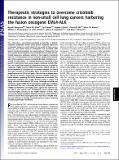| dc.contributor.author | Katayama, Ryohei | |
| dc.contributor.author | Benes, Cyril H. | |
| dc.contributor.author | Lifshits, Eugene | |
| dc.contributor.author | Ebi, Hiromichi | |
| dc.contributor.author | Rivera, Victor M. | |
| dc.contributor.author | Shakespeare, William C. | |
| dc.contributor.author | Iafrate, A. John | |
| dc.contributor.author | Engelman, Jeffrey A. | |
| dc.contributor.author | Shaw, Alice | |
| dc.date.accessioned | 2011-12-02T19:46:27Z | |
| dc.date.available | 2011-12-02T19:46:27Z | |
| dc.date.issued | 2011-04 | |
| dc.date.submitted | 2010-12 | |
| dc.identifier.issn | 0027-8424 | |
| dc.identifier.issn | 1091-6490 | |
| dc.identifier.uri | http://hdl.handle.net/1721.1/67357 | |
| dc.description.abstract | The echinoderm microtubule-associated protein-like 4 (EML4)-anaplastic lymphoma kinase (ALK) fusion oncogene represents a molecular target in a small subset of non-small cell lung cancers (NSCLCs). This fusion leads to constitutive ALK activation with potent transforming activity. In a pivotal phase 1 clinical trial, the ALK tyrosine kinase inhibitor (TKI) crizotinib (PF-02341066) demonstrated impressive antitumor activity in the majority of patients with NSCLC harboring ALK fusions. However, despite these remarkable initial responses, cancers eventually develop resistance to crizotinib, usually within 1 y, thereby limiting the potential clinical benefit. To determine how cancers acquire resistance to ALK inhibitors, we established a model of acquired resistance to crizotinib by exposing a highly sensitive EML4-ALK–positive NSCLC cell line to increasing doses of crizotinib until resistance emerged. We found that cells resistant to intermediate doses of crizotinib developed amplification of the EML4-ALK gene. Cells resistant to higher doses (1 μM) also developed a gatekeeper mutation, L1196M, within the kinase domain, rendering EML4-ALK insensitive to crizotinib. This gatekeeper mutation was readily detected using a unique and highly sensitive allele-specific PCR assay. Although crizotinib was ineffectual against EML4-ALK harboring the gatekeeper mutation, we observed that two structurally different ALK inhibitors, NVP-TAE684 and AP26113, were highly active against the resistant cancer cells in vitro and in vivo. Furthermore, these resistant cells remained highly sensitive to the Hsp90 inhibitor 17-AAG. Thus, we have developed a model of acquired resistance to ALK inhibitors and have shown that second-generation ALK TKIs or Hsp90 inhibitors are effective in treating crizotinib-resistant tumors harboring secondary gatekeeper mutations. | en_US |
| dc.description.sponsorship | The V Foundation for Cancer Research Translational Grant | en_US |
| dc.description.sponsorship | Charles W. and Jennifer C. Johnson Koch Institute Clinical Investigator Award | en_US |
| dc.description.sponsorship | National Institutes of Health (NIH) (Grant CA120060-01) | en_US |
| dc.description.sponsorship | Sig Adler Lung Cancer Research Fund | en_US |
| dc.description.sponsorship | Massachusetts General Hospital | en_US |
| dc.description.sponsorship | Japan Society for the Promotion of Science | en_US |
| dc.language.iso | en_US | |
| dc.publisher | National Academy of Sciences | en_US |
| dc.relation.isversionof | http://dx.doi.org/10.1073/pnas.1019559108 | en_US |
| dc.rights | Article is made available in accordance with the publisher's policy and may be subject to US copyright law. Please refer to the publisher's site for terms of use. | en_US |
| dc.source | PNAS | en_US |
| dc.title | Therapeutic strategies to overcome crizotinib resistance in non-small cell lung cancers harboring the fusion oncogene EML4-ALK | en_US |
| dc.type | Article | en_US |
| dc.identifier.citation | Katayama, R. et al. “Therapeutic strategies to overcome crizotinib resistance in non-small cell lung cancers harboring the fusion oncogene EML4-ALK.” Proceedings of the National Academy of Sciences 108 (2011): 7535-7540. Web. 2 Dec. 2011. © 2011 New York Academy of Sciences | en_US |
| dc.contributor.department | Koch Institute for Integrative Cancer Research at MIT | en_US |
| dc.contributor.approver | Shaw, Alice | |
| dc.contributor.mitauthor | Shaw, Alice | |
| dc.relation.journal | Proceedings of the National Academy of Sciences of the United States of America | en_US |
| dc.eprint.version | Final published version | en_US |
| dc.type.uri | http://purl.org/eprint/type/JournalArticle | en_US |
| eprint.status | http://purl.org/eprint/status/PeerReviewed | en_US |
| dspace.orderedauthors | Katayama, R.; Khan, T. M.; Benes, C.; Lifshits, E.; Ebi, H.; Rivera, V. M.; Shakespeare, W. C.; Iafrate, A. J.; Engelman, J. A.; Shaw, A. T. | en |
| mit.license | PUBLISHER_POLICY | en_US |
| mit.metadata.status | Complete | |
